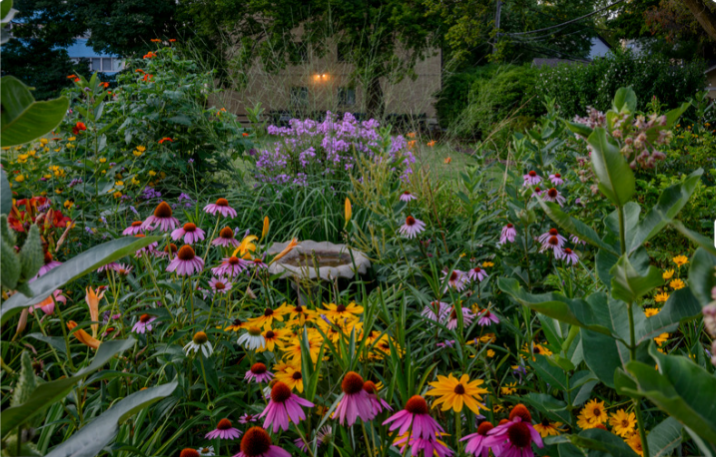Gardeners are always branching out, so try the sustainable root
A sustainable and healthy NC garden.
March 22, 2023
California announced its first water restriction in 2015, which limited watering gardens, flower beds, and people’s well maintained lawns. Even though it wasn’t the first time people started questioning the sustainability of their gardens, it was significant enough to raise national concern. So, here is the next big question: What needs to be done to maintain a sustainable garden in North Carolina?
Consider Native vs. Invasive
One of the first things to start thinking about when planting is what you’re introducing to the environment. Sure, some non native plants might look a little flashier, but that doesn’t mean they can live here just because you do. In North Carolina, there are plenty of beautiful bushes, flowers and trees that are meant to be in our yards. Planting native blooms for each season will help keep your flower bed nice and bright all year long. Check out the North Carolina Extension Gardener Handbook to learn more about the native plants you can choose.
Don’t Waste Water
One of the most crucial tasks in gardening is watering your plants. However, mother nature is rarely on the same schedule as the rest of North Carolinians. One big thing to get into the habit of is tracking when it will rain; this will keep you from overwatering, therefore not wasting water either. When it rains, collecting the rainwater is also a lot better and cheaper than running the hose. Watering gardens, lawns and everything in between can be very wasteful, a good motto to keep in mind is don’t use what you don’t have to.
Avoid Plastic Pots
One of the best ways to keep your garden fun is to try out what is called “upcycling.” This is just a fancy word for reusing something you no longer need.You have probably seen the cute photos of plants in old shoes or painted tires; it is a great and creative way to keep your outside space fun and beneficial/valuable/productive/utilizing(?) for the environment around you. However, if you want a more traditional look that doesn’t consist of old basketballs, clay pots are always better and healthier for your plants rather than plastic.
Don’t Use Pesticides
Pesticides can be linked to many health hazards, such as cancer, kidney or liver damage and birth defects. They contaminate the soil and the water while endangering natural wildlife, like pollinators, which are good for your garden. There are many natural ways of keeping nibbling bugs off your plants, for instance nets laid on top of your plants or natural pesticides that can be used depending on what you’re growing and trying to keep out. For example, a vegetable oil spray is great for keeping away aphids, mites and thrips.
Always Bee Researching
Always know what you are introducing to your garden, what you’re spraying on your plants and what you’re adding to the soil. Research overall will help you be able to keep you and your garden a little greener.
Not everyone is a gardener at heart, but just because you don’t have a green thumb doesn’t mean you shouldn’t try it. Gardens have been shown to reduce stress levels, increase self-esteem and depending on what you’re growing can improve your diet. North Carolina is a beautiful state, and sustainable gardening is one way to help keep it that way.






